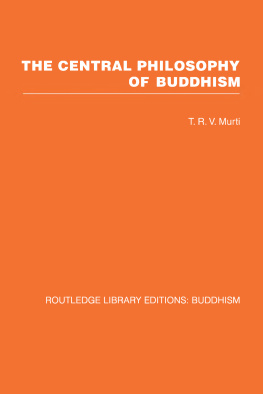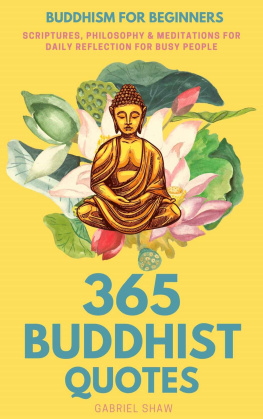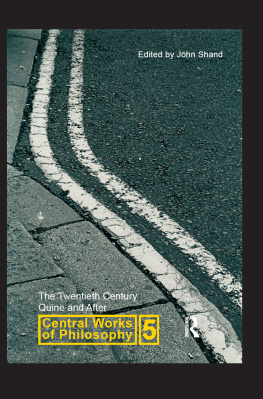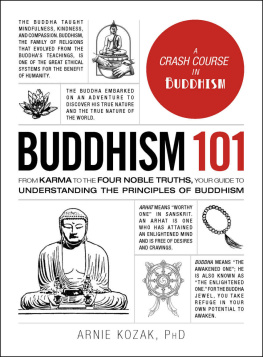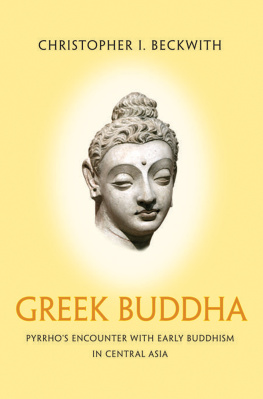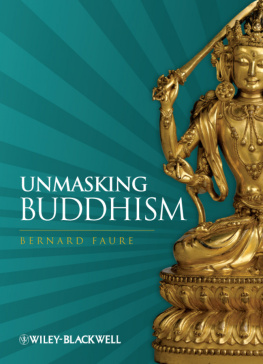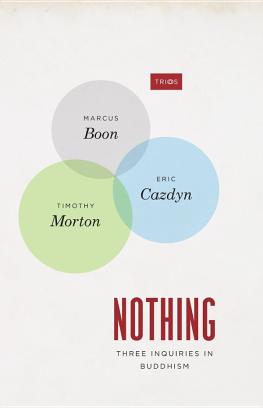Murti - The Central Philosophy of Buddhism
Here you can read online Murti - The Central Philosophy of Buddhism full text of the book (entire story) in english for free. Download pdf and epub, get meaning, cover and reviews about this ebook. year: 2013,1955, publisher: Taylor and Francis, genre: Religion. Description of the work, (preface) as well as reviews are available. Best literature library LitArk.com created for fans of good reading and offers a wide selection of genres:
Romance novel
Science fiction
Adventure
Detective
Science
History
Home and family
Prose
Art
Politics
Computer
Non-fiction
Religion
Business
Children
Humor
Choose a favorite category and find really read worthwhile books. Enjoy immersion in the world of imagination, feel the emotions of the characters or learn something new for yourself, make an fascinating discovery.
The Central Philosophy of Buddhism: summary, description and annotation
We offer to read an annotation, description, summary or preface (depends on what the author of the book "The Central Philosophy of Buddhism" wrote himself). If you haven't found the necessary information about the book — write in the comments, we will try to find it.
Murti: author's other books
Who wrote The Central Philosophy of Buddhism? Find out the surname, the name of the author of the book and a list of all author's works by series.
The Central Philosophy of Buddhism — read online for free the complete book (whole text) full work
Below is the text of the book, divided by pages. System saving the place of the last page read, allows you to conveniently read the book "The Central Philosophy of Buddhism" online for free, without having to search again every time where you left off. Put a bookmark, and you can go to the page where you finished reading at any time.
Font size:
Interval:
Bookmark:

ROUTLEDGE LIBRARY EDITIONS: BUDDHISM
THE CENTRAL PHILOSOPHY OF BUDDHISM
A Study of the Mdhyamika System
By
T. R. V. Murti
Volume 12

First published in 1955
This edition first published in 2008 by
Routledge
2 Park Square, Milton Park, Abingdon, Oxon, OX14 4RN
Simultaneously published in the USA and Canada
by Routledge
270 Madison Avenue, New York, NY 10016
Routledge is an imprint of the Taylor & Francis Group, an informa business
Transferred to Digital Printing 2009
1955 Routledge
All rights reserved. No part of this book may be reprinted or reproduced or utilised in any form or by any electronic, mechanical, or other means, now known or hereafter invented, including photocopying and recording, or in any information storage or retrieval system, without permission in writing from the publishers.
British Library Cataloguing in Publication Data
A catalogue record for this book is available from the British Library
Library of Congress Cataloging in Publication Data
A catalog record for this book has been requested
ISBN 10: 0-415-44291-5 (Set)
ISBN 13: 978-0-415-44291-6 (Set)
ISBN 10: 0-415-46118-9 (Volume 12)
ISBN 13: 978-0-415-46118-4 (Volume 12)
Publishers Note
The publisher has gone to great lengths to ensure the quality of this reprint but points out that some imperfections in the original copies may be apparent.
THE CENTRAL PHILOSOPHY OF BUDDHISM
A Study of the Mdhyamika System
BY
T. R. V. MURTI M.A., D.LITT.
stri (Vednta), chrya (Vykaraa) Sayaji Rao Gaekwad Professor of Indian Civilization and Culture Hindu University, Banaras

FIRST PUBLISHED IN 1955
This book is copyright under the Berne Convention. Apart from any fair dealing for the purposes of private study, research, criticism or review, as permitted under the Copyright Act 1911, no portion may be reproduced by any process without written permission. Enquiry should be made to the publisher.
PRINTED IN GREAT BRITAIN
in II point Old Style type
BY C. TINLING & CO., LTD.,
LIVERPOOL, LONDON AND PRESCOT
TO MY REVERED TEACHER
PROFESSOR S. RADHAKRISHNAN
"ALTHOUGH a hundred years have elapsed since the scientific study of Buddhism has been initiated in Europe, we are nevertheless still in the dark about the fundamental teachings of this religion and its philosophy. Certainly no other religion has proved so refractory to clear formulation." This observation of the late Professor Stcherbatsky made in 1927 ( The Conception of Buddhist Nirva, p. 1) remains no less true today. It is also a measure of the difficulties which one encounters in this field. The vastness of Buddhism is surprisingly immense. An extensive and varied literature, canonical, exegetical and systematic, covering a period of more than fifteen centuries, is scattered in a score of languages, Sanskrit, Pli, Tibetan, Chinese and several Mongolian languages. Its complexity is no less formidable; its schools and sub-schools are bewildering in their number and in the twists and turns of their thought. The greatest difficulty encountered is the lack of an accredited tradition of interpretation which might set aright many inaccuracies and shortcomings in our understanding. In spite of these admitted difficulties, a determined attempt should be made to understand Buddhism. This is essential for a correct and fruitful understanding of Indian philosophy and religion on which Buddhism has exercised a profound and permanent influence. Moreover, Buddhism forms the staple culture of the south, east and far-east Asian countries. A study of Buddhism should also prove valuable as a contribution to world-culture. And this may not be without significance in the context of the present-day world.
The Mdhyamika philosophy claims our attention as the system which created a revolution in Buddhism and through that in the whole range of Indian philosophy. The entire Buddhist thought turned on the nyat doctrine of the Mdhyamika. The earlier pluralistic phase of Buddhism, its rejection of substance and the rather uncritical erection of a theory of elements, was clearly a preparation for the fully critical and self-conscious dialectic of Ngr juna. The Yogcra-Vijnavda Idealism explicitly accepts the nyat of the Mdhyamika, and gives it an idealistic turn. The critical and absolutist trend in Brahmanical thought is also traceable to the Mdhyamika.
Considering the r1e and the importance of the Mdhyamika, I have ventured to appraise it as the Central Philosophy of Buddhism. Modern literature on the subject is neither too plentiful nor free from misunderstanding. Our standard text-books on Indian philosophy content themselves with a perfunctory treatment of the system. There is a tendency on the part of some critics and historians of thought to dismiss it as nihilism; many even identify it with the Vednta. Such criticism is as uninformed as it is misleading. Stcherbatsky's book, The Conception of Buddhist Nirva, is an exception to this. But it is hardly to be expected that in the course of about 60 pages, most of which are devoted to polemic and the elucidation of the conception of nirva, anything like an adequate exposition of the Mdhyamika philosophy could be made. The present work is an attempt to fill this gap in our knowledge. It is a full study of the Mdhyamika philosophy in all its important aspects.
The book falls into three well-defined but connected parts of unequal length. The first is mainly historical: it traces the origin and development of the Mdhyamika philosophy, its dialectic, as the attempt to resolve the conflict that was engendered by the two main traditions of Indian philosophy, the tmavda (substance view of reality) and the antmavda (modal view of reality). The anticipations of the dialectic are to be found in the celebrated 'silence' of Buddha, in his refusal to speculate and to predicate empirical categories of the transcendent reality. The development of the Mdhyamika stages and schools of thought and their literature is dealt with at some considerable length. The possible influence of the Mdhyamika on later philosophy, especially on the Vijnavda and the Vednta, is also indicated. The second and main part is devoted to a full and critical exposition of the Mdhyamika philosophy, the structure of its dialectic, the application of the dialectic to categories of thought, its conception of the Absolute, and its ethics and religion. The chapter on the Application of the Dialectic is chiefly of historical interest and is somewhat technical; it may be omitted on the first reading. The last part of the book compares the Mdhyamika with some of the well-known dialectical systems of the West (Kant, Hegel and Bradley), and undertakes a short study of the different absolutisms (Mdhyamika, Vijnavda and the Vednta) whose different standpoints are not generally appreciated.
There is a measure of risk in comparative studies. No two systems of thought or even aspects of them are quite identical or similar. On the other hand, if they were absolutely unique, we could not differentiate or understand them. My constant endeavour has been to draw distinctions, on every important topic, between the Mdhyamika, the Vijnavda and the Vednta. I have also tried to understand the development of thought here in the light of the known development of similar trends in the West. In particular, I have made pointed references to Kant as elucidating aspects of the Mdhyamika. I have tried to be on my guard with regard to the differences in outlook and background of Indian and Western philosophy. In spite of its shortcomings, the comparative method is perhaps the only way by which Indian thought could be made intelligible to the Western reader in terms of the philosophical ideas with which he is familiar.
Font size:
Interval:
Bookmark:
Similar books «The Central Philosophy of Buddhism»
Look at similar books to The Central Philosophy of Buddhism. We have selected literature similar in name and meaning in the hope of providing readers with more options to find new, interesting, not yet read works.
Discussion, reviews of the book The Central Philosophy of Buddhism and just readers' own opinions. Leave your comments, write what you think about the work, its meaning or the main characters. Specify what exactly you liked and what you didn't like, and why you think so.

